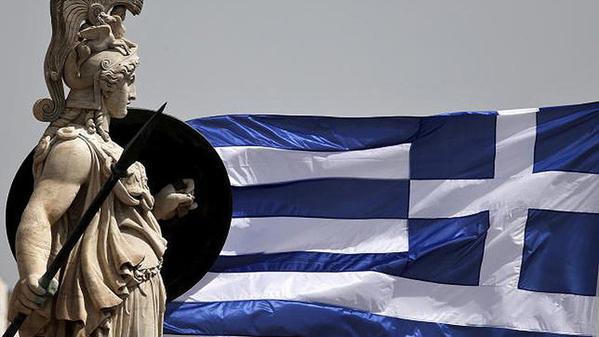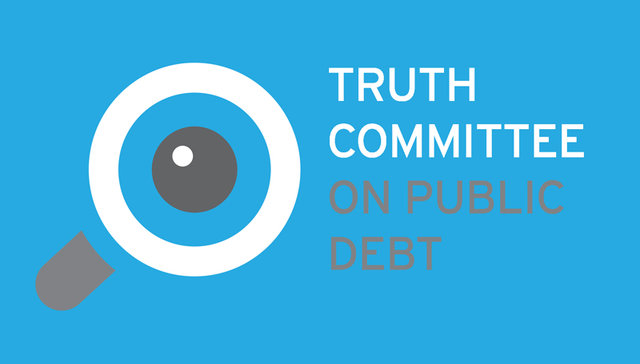Jezabel Goudinoff; Member of the PACD, Barcelona’s 15M and the citizen journalism group Peoplewitness.
Entry originally published in the blog ‘Living in Debtocracy’, the public blog of the PACD.
Back in November 2014, the major Greek cities experienced a day of the largest demonstrations that can be recalled in recent years. All this was preceded by student demonstrations during the previous days in which intense clashes with police occurred.
On 17th November 1973, tanks of the colonels’ military regime demolished the gates of Athens Polytechnic University, where a group of students shouting “Bread, Education and Freedom” had locked themselves in striking since the previous 14th. The junta’s regime would fall a few months later, and on that same date the following year the first democratic elections would be called. Today, 41 years after the crush of this insurrection, there is no doubt that those three demands continue to be as valid as ever and that austerity, the trademark imposed by the Troika, is adding more areas to include in that claim on a daily basis. After a period of protests totally ignored by the government and by Europe, everything appeared to have calmed down in Greece, but it is the calm experienced in the eye of the storm.
If you were a Greek citizen, you would have a 27% chance of being on the lists of the unemployment office although it is estimated that you would have a real probability of 35% of being unemployed. Even if you were employed, you could only collect your salary since an average of 3 months ago. If you were a teacher, you could access the new plan, which involves the hiring of 1,100 teachers on a ‘voluntary work’ basis. Anyway slavery is not as bad as they paint it to be. Your children would have a 27% possibility of being malnourished and fainting in a ransacked public school, practically devoid of resources. Your labour rights would now be a dream of a past life and depending on the sector in which you work, would be under the regime of forced requisition, i.e. without the right to strike. You would also have more than a 35% chance of being excluded from healthcare coverage even if you were a minor as only children of insured parents enjoy that ‘privilege’. Even with that right in your back pocket, you could not be treated in a CAP for flu, as they were all closed overnight last February. You would have to wait in queues kilometres long at an overburdened hospital or dip into your little savings and go to a private clinic, assuming that you have them or you don’t need them to pay for food or energy bills to heat your home. After visiting the clinic, perhaps you would go looking for wood to burn and heat your home, which would produce, let’s say in Athens, more than alarming levels of pollution. It could also cause your death in an ‘accidental’ fire. Your government would then blame you for trying to keep yourself warm and Europe would say you had lived beyond your means and from what your laziness allowed. Although that does sound familiar, maybe.
Nobody would talk about the more than 100 deaths due to avian flu last winter.
As for the macroeconomic figures, austerity, for which the IMF itself has apologised without a hint of an intention to alleviate it, would have caused a 26% contraction of the GDP of the country, the bankruptcy of thousands of small businesses and traders and the collapse of large corporations, the mass dismissal of public officials and the destruction of the social fabric. Public debt would have increased by 170% of its GDP – which technically makes it unpayable – and they would pressure you with new taxes on your home (an increase of 514% in comparison with 2009, if that seems little), your food, your energy and VAT at 23%. That would be accompanied by a wave of privatisations of public companies that would make services like transport or water inaccessible, as well as degradation of existing public services such as education or healthcare. But yes, your government would have promised free WIFI for everyone.
For if you were one of those people that complains a lot and gets organised, you should prepare yourself for repression, ranging from the massive use of gas to dissolve even small sectorial protests, using strong violence and police presence on the streets, even police assemblies that would mean you end up in prison in solitary confinement. And if you were a migrant, the ordeal that could be described here would give way to a whole other article, still unfinished in an Immigrant Detention Centre.
The electoral option wouldn’t provide you with too much hope. Syriza leads against Nea Democratia (your PP, so we understand each other), by 11 points. But distant is that radicalism which publicised the leftist coalition beyond the borders of your country. The discourse has evolved from not paying the debt to recapitalising banks to revitalise (rather, resurrect) the battered Greek economy. Syriza has learned from the elections of 2012, in which the counter-campaign to which everyone else submitted to by force and neoliberal Europe, mobilised enough votes of fear to make it lose the election. Its radicalisation has led it not only to talk about recapitalising banks, also to open up to business sectors (including the Bilderberg group) and the Church, which has brought it far from little criticism. Its positions are more like those of PASOK of a few years ago (your Socialist Party, so to speak, in a total decline after its government pact with ND, with less than 5% in the polls) than its own from a couple of years ago. Sure, they would be better than those who govern now, or at least more sensitive to social problems, but can that awareness overcome the blackmail of 170% of public debt without considering the non-payment? Can you have enough room and sovereignty to reverse austerity and structural measures imposed by the Troika on the MDEs and substitutes in the form of multi-laws? Almost nobody believes it, but it can ease the climate of political repression and social defeat and breath some fresh air into social movements.
The failure of economic policies implemented by previous governments and the destruction of the social fabric have fertilised the ground for right-wing formation, Golden Dawn, has an electoral support of 7.5% according to recent polls and the majority of its members in prison for belonging to criminal gangs – all this happening after the murder of antifascist singer Pavlos Fyssas in September 2013 – after years of operating with impunity and with the collaboration, in many cases, of the police, has 60% of voters (and many militants). They also represent the crude nationalism that fuels Europe with the loss of sovereignty of the states in favour of European mechanisms, principally economic, of unelected representatives and of lack of transparency, the Europe of the markets. The principal objective of the formation, to blame the situation on the migrants, for parasatising the country. And against that objective, although not the only one, they protest in the streets. There have now been more than 200 reported attacks in Athens alone since November 2009. The magnitude of unreported attacks is unknown. Their strategy, copies by other European extreme right groups, consists in giving false help in the form of welfare, only to Greek families.
In the face of that Europe of the Markets stands another Greece, which rethinks economic relations between people, and moves away from the model of ultra-consumerism and waste. It’s the Greece of supportive and cooperative economy networks, an economy of humane dimension that has seen rapid growth and that every day is consolidating itself: they haven’t come to patch things up, but to stay. Although it extends through citizens’ assemblies born from plazas to collectively meet local needs, these self-managed structures are realising they have created a path that leads them to rethink the way we live and there is no turning back. Its principles are based on direct democracy, on horizontal and participatory decision making, and the transformation of plurality in collective intelligence. They foster creativity, communication, mutual support and sustainability.
After a year of living those experiences directly, we have been able to see how many different initiatives work: Time banks to reduce dependence on money; bazaars for the exchange of unused items; markets without intermediaries and social currencies; Self-managed Social Clinics giving basic health coverage to the excluded, and getting attention for cases that require intervention, making noise in the media; eco-communities that have decided to return to the countryside to live a simpler but freer life; cooperatives of various types and self-managed spaces; initiatives against the privatization of water that they even talk about collectivisation; citizen initiatives against the construction of a gold mine in the open air in Chalkidiki; public universities and schools for auto-managed education… And it is impossible to forget the workers of VioMe who occupied the factory after its closure and went from claiming their compensation to redirecting production towards the production of natural soaps. Today they continue to fight for their dignity and their right to work. Some of these experiences have been collected in this computer generated graph.
Events such as the Festival of Direct Democracy in Thessaloniki, the Festival of Supportive and Cooperative Economy in Athens or the CommonsFest in Crete help bring coherence and visibility to those alternatives and, little by little, create bonds between them and others beyond the Greek borders. Greece was turned into a test laboratory for neoliberalism, but that has also awakened creativity to rethink the world and relationships that are produced within it. Amid the feeling of the fall of society, hope is a more than precious commodity and that is precisely what these initiatives bring to their participants.
And, you know what? If you lived in Greece and participated in one of those initiatives, you would smile.
Note:
The data and news for this article have been extracted from the websites of the Festival for Solidarity, Cooperative and Economy, Keep Talking Greece, X-Pressed, Info Grecia, Autonomias o The City at Time of Crisis. Parts of those experiences narrated have been extracted from the blog On The Road of 15MBcn Internacional.



